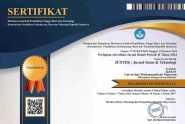Development of Problem Based Learning-Based Digital Pocket Book to Improve Problem Solving Ability
Abstract
Abstract: This study aims to determine the problem-based learning-based digital pocket book to improve problem-solving skills that reach the level of validity, practicality and effectiveness. This research method is research and development using 4-D models (Four-D Models) by Thiagarajan. The research subjects were students of class VIII SMP Negeri 12 Pontianak totaling 32 students, experts, and teachers. The instruments used in this study were validation sheets, questionnaires, and posttest questions. Based on the research results, the results of the validation of digital pocket books based on problem based learning to improve problem solving skills have a percentage of 90.44% with very valid criteria. The level of practicality of problem-based learning-based digital pocket books to improve problem-solving skills is classified as having a very practical level with a percentage of 88%. In addition, for the results of the effectiveness level of problem-based learning-based digital pocket books to improve problem-solving skills, the posttest average result is 81% with effective criteria. Thus, it can be concluded that the problem-based learning-based digital pocket book to improve problem-solving skills developed can be used because it meets the criteria of very valid validity, very practicality, and effective effectiveness.
Abstrak: Penelitian ini bertujuan untuk mengetahui buku saku digital berbasis problem based learning untuk meningkatkan kemampuan pemecahan masalah yang mencapai tingkat kevalidan, kepraktisan dan keefektifan. Metode penelitian ini adalah penelitian pengembangan (Research and Development) dengan menggunakan model 4-D (Four-D Models) oleh Thiagarajan. Subjek penelitian adalah siswa kelas VIII SMP Negeri 12 Pontianak yang berjumlah 32 orang siswa, ahli, dan guru. Instrumen yang digunakan dalam penelitian ini adalah lembar validasi, angket, dan soal posttest. Berdasarkan hasil penelitian diperoleh hasil validasi buku saku digital berbasis problem based learning untuk meningkatkan kemampuan pemecahan masalah memiliki persentase 90,44 % dengan kriteria sangat valid. Tingkat kepraktisan terhadap buku saku digital berbasis problem based learning untuk meningkatkan kemampuan pemecahan masalah tergolong memiliki tingkat sangat praktis dengan persentasenya sebesar 88%. Selain itu untuk hasil tingkat keefektifan terhadap buku saku digital berbasis problem based learning untuk meningkatkan kemampuan pemecahan masalah memiliki hasil rata-rata posttest sebesar 81% dengan kriteria efektif. Dengan demikian dapat disimpulkan bahwa buku saku digital berbasis problem based learning untuk meningkatkan kemampuan pemecahan masalah yang dikembangkan dapat digunakan karena memenuhi kriteria kevalidan yang sangat valid, kepraktisan yang sangat praktis, dan keefektian yang efektif.
Keywords
Full Text:
PDFReferences
Gunantara, G., Suarjana, M., & Nanci, R. (2014). Application of Problem Based Learning Learning Model to Improve Mathematics Problem Solving Ability of Class V Students. Journal of the PGSD Pulpit, Universitas Pendidikan Ganesha, 2(2), 146–152. https://doi.org/10.15294/kreano.v10i2.19671
Hermawan, A. F., & Ekohariyadi. (2019). Development of an Android-Based Digital Pocket Book Application as a Mobile Learning Media in Basic Programming Subjects for Class X TKJ Students at SMKN 1 Sidayu Gresik. 03.
Hodiyanto, H. (2019). The Effect of Problem Based Learning Model on Students' Higher Order Thinking Skills (Hots). Buana Mathematics: Scientific Journal of Mathematics and Mathematics Education, 8(2:), 101–108. https://doi.org/10.36456/buana_matematika.8.2:.1750.101-108
Hodiyotno, Darma, Y., & Putra, S. R. S. (2020). Development of Macromedia Flash-Based Learning Media Containing Problem Posing on Mathematical Problem Solving Ability. Journal of Mathematics Education, 9, 323–334.
Kurniawan, A. R., Kardi, S., & Tjandrakirana. (2016). Development of Science Learning Tools Based on Guided Discovery Approach to Practice Process Skills of Elementary School Students. 2(2), 175–183.
Oktaviana, D., & Susiaty, U. D. (2020). Pengembangan Bahan Ajar Matematika Diskrit Dalam Meningkatkan Kemampuan Pemecahan Masalah Matematis Mahasiswa IKIP PGRI Pontianak. SAP (Susunan Artikel Pendidikan), 4(3). https://doi.org/10.30998/sap.v4i3.6280
Putri, N. A. (2013). Instilling Character Education Values Through Sociology Subjects. COMMUNITY: International Journal of Indonesian Society and Culture, 3(2), 205–215. https://doi.org/10.15294/komunitas.v3i2.2317
Setiyani, S., Hapsari, T., Ferdianto, F., Sagita, L., & Irawanti, A. C. (2021). Development of Prezi-Assisted Interactive Media on Mathematical Understanding Ability of Two Variable Linear Equation System Topics. Soulmath Scientific Journal: Journal of Mathematics Education Education, 9(1), 11. https://doi.org/10.25139/smj.v9i1.3325
Sulistri, E., Sunarsih, E., & Utama, E. G. (2020). Development of Ethnoscience-Based Digital Pocket Book in Singkawang City Elementary School. 6(3), 522–531.
Yustianingsih, R., Syarifuddin, H., & Yerizon, Y. (2017). Development of Problem Based Learning (PBL) Mathematics Learning Devices to Improve Problem Solving Ability of Class VIII Students. JNPM (National Journal of Mathematics Education), 1(2), 258. https://doi.org/10.33603/jnpm.v1i2.563Oktaviana, D., & Susiaty, U. D. (2020). Pengembangan Bahan Ajar Matematika Diskrit Dalam Meningkatkan Kemampuan Pemecahan Masalah Matematis Mahasiswa IKIP PGRI Pontianak. SAP (Susunan Artikel Pendidikan), 4(3). https://doi.org/10.30998/sap.v4i3.6280
DOI: https://doi.org/10.31764/justek.v4i2.6237
Refbacks
- There are currently no refbacks.
JUSTEK : Jurnal Sains dan Teknologi sudah terindeks
EDITORIAL OFFICE:












.JPG)

